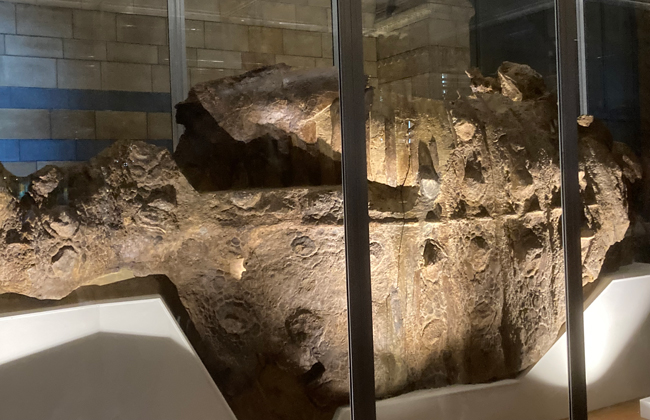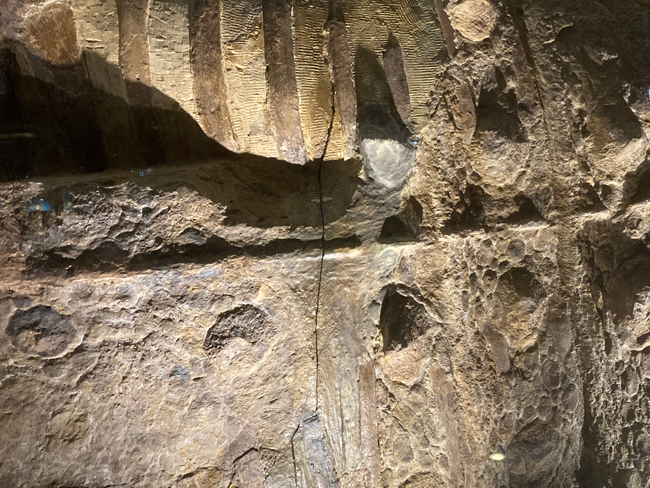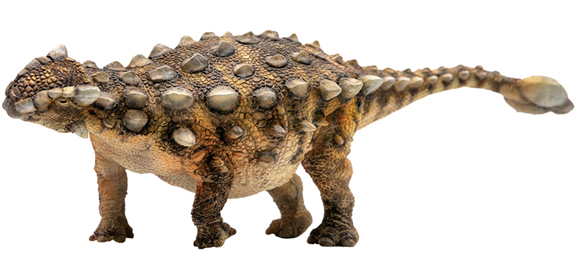The Stunning Scolosaurus cutleri – An Ankylosaur with Skin
The preserved remains of an ankylosaur represents one of the most spectacular dinosaur fossil specimens on display at the London Natural History Museum. Although large, this wonderful armoured dinosaur is often overlooked by visitors. Like many of the Museum’s exhibits it is poorly lit. This is Scolosaurus cutleri (NHMUK R5161) and it is probably one of the most amazing ornithischian dinosaur fossils ever found.

The stunning Scolosaurus cutleri specimen on display at the London Natural History Museum. The specimen (NHMUK R5161) discovered in Alberta, Canada is one of the best preserved ankylosaurid specimens known to science. Picture credit: Everything Dinosaur.
Picture credit: Everything Dinosaur
Scolosaurus cutleri (NHMUK R5161)
Scolosaurus (S. cutleri) was named and described by Baron Franz Nopcsa in 1928. The spectacular fossil material on display at the Museum represents the holotype. The specimen is nearly complete. Although, the skull, the end of the tail and limbs from the right side of the animal are missing. It was excavated from a bedding plane associated with the lower portions of the Dinosaur Park Formation (Alberta, Canada). The specimen was discovered by commercial fossil hunter William Edmund Cutler in 1914. Unfortunately, during the excavation work, an attempt to remove material from underneath the fossils resulted in the specimen collapsing on Cutler. He suffered extensive injuries to his chest.

A close-up view of the preserved skin impression associated with the S. cutleri fossil specimen NHMUK R5161. This amazing fossil is on display at the London Natural History Museum. Picture credit: Everything Dinosaur.
Picture credit: Everything Dinosaur
The Skin of an Ankylosaurid
NHMUK R5161 is on display in the public galleries. An extensive amount of the integument is preserved as skin impressions. The picture (above) shows the osteoderms preserved on the back of the animal. Ribs can be seen at the top of the photograph. Osteoderms are not connected to bone. They form in the dermis and as a result, most osteoderms are found as isolated pieces of the skeleton. This Scolosaurus cutleri specimen shows them in life position.
Classified as a member of the subfamily Ankylosaurini, it was related to other North American ankylosaurids such as Ankylosaurus magniventris and Euoplocephalus tutus. Phylogenetic analysis places Scolosaurus as the sister taxon to Ziapelta (Ziapelta sanjuanensis) from New Mexico.
To read an earlier Everything Dinosaur article about the discovery of Ziapelta: New Armoured Dinosaur from New Mexico.
A spokesperson from Everything Dinosaur confirmed that the Scolosaurus cutleri (NHMUK R5161) had been the inspiration behind the dermal armour configuration on numerous armoured dinosaur models.

“Sede” the Ankylosaurus (PNSO). The dermal armour on this dinosaur model was most probably inspired by the Scolosaurus cutleri holotype material.
The picture (above) shows the PNSO Ankylosaurus dinosaur model. The dermal armour on this figure has most probably been inspired by the Scolosaurus holotype material.
To view the range of PNSO prehistoric animal figures available from Everything Dinosaur: PNSO Prehistoric Animal Models.
Remembering William Edmund Cutler
The spokesperson added:
“When we visit the Museum, we always like to say hello to the Scolosaurus specimen. It is a spectacular fossil. We spare a few moments to consider how dangerous fossil collecting can be. This is one dinosaur that proved to be capable of still severely injuring a person some seventy-four million years after the ankylosaurid died. If it were not for the efforts of many commercial fossil hunters today, other amazing dinosaur specimens would be lost to science.”
Visit the award-winning Everything Dinosaur website: Dinosaur Toys and Prehistoric Animal Models.

